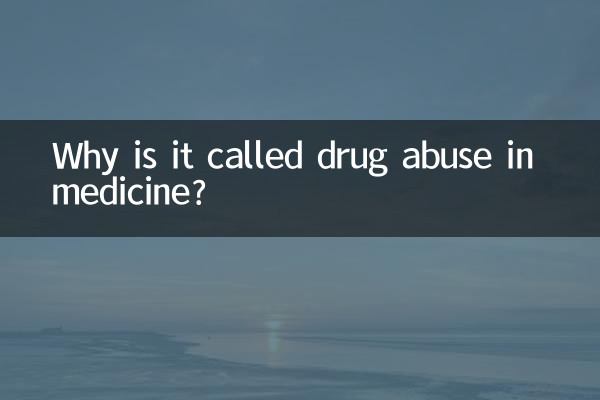What does medicine call drug abuse?
In recent years, the problem of drug abuse has continued to attract attention around the world. The medical community defines drug abuse as a behavior that seriously harms physical and mental health, but the reasons and mechanisms behind it are still worthy of in-depth exploration. This article will analyze the causes, harms and countermeasures of drug abuse from a medical perspective, and combine the hot topics and hot content in the past 10 days to present relevant analysis in the form of structured data.
1. Medical definition and classification of drug abuse

In medicine, drug abuse refers to the illegal or non-medical use of addictive substances that directly act on the central nervous system, leading to physical and psychological dependence. According to the classification of the World Health Organization (WHO), common drugs include the following categories:
| drug type | represents substance | Main hazards |
|---|---|---|
| Opioids | Heroin, morphine | Respiratory depression, high mortality rate |
| doping | methamphetamine, cocaine | cardiovascular disease, mental disorders |
| Hallucinogens | LSD, ecstasy | Hallucinations, cognitive impairment |
| sedative | Barbiturates, sleeping pills | Memory loss, high addiction |
2. Medical causes of drug abuse
The formation of drug abuse behavior involves many factors. Medical research believes that they mainly include the following points:
1.genetic factors: Some people are more susceptible to drugs, which may be related to genetic variation.
2.psychological factors: People with mental illnesses such as depression and anxiety are more likely to become dependent on drugs.
3.social environment: External pressures such as family breakdown and social circle influence may induce drug abuse.
4.neural mechanism: Drugs will stimulate the brain's reward system, leading to abnormal dopamine secretion and forming dependence.
3. Analysis of the correlation between hot topics and drug abuse in the past 10 days
According to search data from the entire Internet, hot topics related to drug abuse in the past 10 days have mainly focused on the following aspects:
| hot topics | Related events | medical interpretation |
|---|---|---|
| celebrity drug scandal | An artist was detained for taking drugs | Drug use by public figures can easily lead to imitation effects |
| The proliferation of new drugs | "E-cigarette oil" drugs seized in many places | New drugs are highly concealed and more harmful |
| Drug addiction treatment breakthrough | An organization releases new drug treatment treatment | Medical intervention can reduce relapse rates |
| Drug abuse among teenagers on the rise | Report shows increased drug use among teenagers | Teenagers’ brains are immature and more susceptible to damage |
4. Medical hazards of drug abuse
The harm of drug abuse to individuals and society cannot be ignored. Medical research shows that its main harms include:
1.physiological hazards: Long-term drug use can lead to organ failure, reduced immunity, and even death.
2.Psychological harm: Drugs can cause schizophrenia, anxiety and other mental illnesses.
3.social harm: Drug addicts may engage in criminal activities and undermine family and social stability.
5. Medical response measures
In response to the problem of drug abuse, the medical community has proposed the following solutions:
| Measure type | Specific content | Implementation effect |
|---|---|---|
| preventive education | Carry out anti-drug propaganda into campus | Raise prevention awareness among young people |
| drug treatment | methadone replacement therapy | Reduce withdrawal reactions |
| psychological intervention | cognitive behavioral therapy | Reduce relapse rate |
| social support | Establish a drug rehabilitation center | Help drug addicts return to society |
6. Conclusion
Drug abuse is not only a social problem, but also a medical problem. Understanding the causes and harms of drug abuse from a medical perspective can help formulate more scientific prevention and treatment strategies. Recent hot events have once again reminded us that anti-drug work requires the joint efforts of the entire society, and the combination of medical research and public education will be the key to dealing with drug abuse in the future.

check the details

check the details